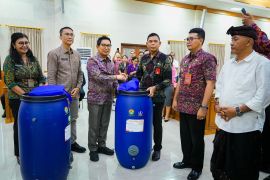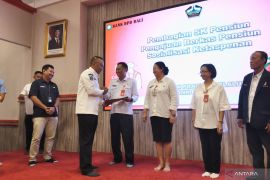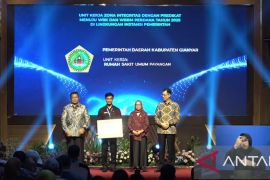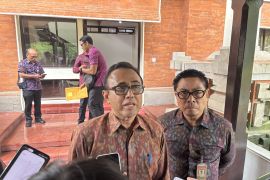Jakarta (Antara Bali) - Chief Minister for Maritime Affairs Luhut Binsar Panjaitan stressed the danger of plastic wastes in sea, which is a threat to the future generations.
Speaking at a workshop on the management of sea and beach trash in Jakarta on Monday, the minister stated that Indonesia was the world's second largest contributor of trash in the sea. Therefore, it has the obligation to take efforts to overcome it.
"Madam (Mrs) Siti Nurbaya (the environment and forestry minister) and I are determined to put an end to the issue of plastic wastes in sea, because of the harmful impact that it would have on the health of the future generation, our grandchildren, and great grandchildren," Luhut noted.
He said that if not handled as soon as possible, the plastic wastes in the sea will be consumed by fish, which when consumed by people will lead to genetic mutations in the body and cause serious health conditions such as cancer and allergy.
"Plastic wastes are non-biodegradable. When these are consumed by fish, which in turn are consumed by human beings, they cause mutations in the body. Therefore, we need to take action so that such harmful mutations would not affect our children. These mutations will influence our genetic system in the next 100 to 200 years," the minister remarked.
Luhut, who was the former coordinating minister for political, legal, and security affairs, pointed out that based on a study, plastic garbage forms more than half of the wastes in Indonesia.
However, the plastic trash is not only from Indonesia but also carried from other countries into Indonesian waters.
Moreover, it has been found that used plastic bottles found in Nipah Island, Riau Islands Province, comes from Singapore.
"Hence, it is not fair on their part to complain about the haze from our country when we receive used plastic bottles from Singapore. Nevertheless, we cannot blame Singapore alone for the plastic wastes, as this is a global problem that should be handled together," the coordinating minister for maritime affairs noted.
He also explained that based on the results of the monitoring of the Indonesian Agency for Assessment and Application of Technology (BPPT), plastic trash could be traced up to 2 thousand meters under the sea surface.
According to Luhut, this condition needs the attention of all stakeholders. It is the responsibility of all segments of the people.
"No matter whether they are Hindu, Buddha, Christianity, or Islam followers, they all have the same responsibility and the right to live. Hence, the younger generations must be determined to combat wastes in the sea," the minister remarked. (WDY)









